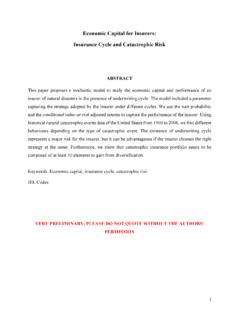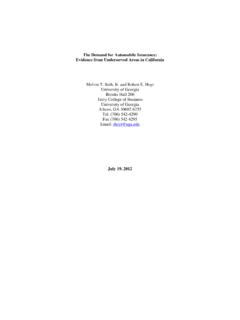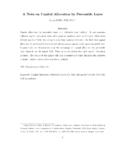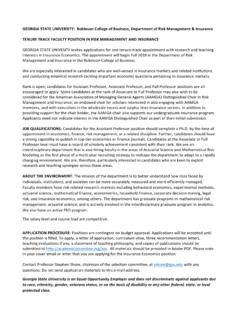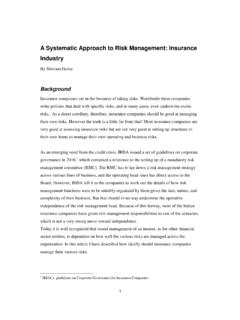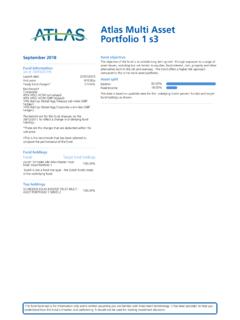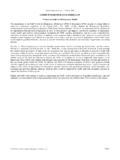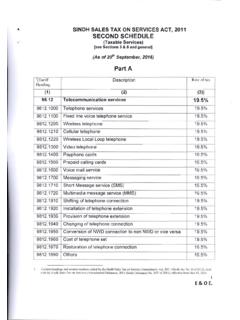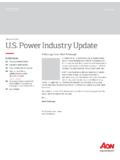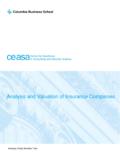Transcription of THE EFFECT OF INTERNATIONALIZATION ON …
1 THE EFFECT OF INTERNATIONALIZATION ON home market . performance : EVIDENCE FROM GERMAN INSURANCE. GROUPS. Muhammed Altuntas University of Cologne Department of Risk Management and Insurance D-50923 Cologne Telephone: +49-221-470-5805. Fax: +49-221-428349. Email: Gerrit G mann University of Cologne Department of Risk Management and Insurance D-50923 Cologne Email: July, 2012. THE EFFECT OF INTERNATIONALIZATION ON home market . performance : EVIDENCE FROM GERMAN INSURANCE. GROUPS. ABSTRACT. In this paper we investigate the EFFECT of INTERNATIONALIZATION on home market performance using survey data and financial statement data of German insurance groups with property-liability business for the years 1999 through 2009. We develop a resource-based perspective and argue that strategic transformation is a major factor driving insurance groups' INTERNATIONALIZATION , whereby successful international insurance groups facilitate organizational learning from interna- tional operations to enhance home market performance .
2 Our findings corroborate this notion and show that the establishment of branch offices as well as greater INTERNATIONALIZATION is positively correlated with home market performance . JEL Classifications: G22, L25, F23. Key words: INTERNATIONALIZATION , insurance company operations, performance . THE EFFECT OF INTERNATIONALIZATION ON home . market performance : EVIDENCE FROM GERMAN. INSURANCE GROUPS. INTRODUCTION. A firm's decision to expand operations to international markets has far reaching impli- cations that can shape operations for multiple years and impact its future profitability and growth opportunities (Altuntas and Berry-St lzle, 2010). Recognizing the importance of inter- nationalization, researchers have extensively examined firm-specific, industry and environmen- tal factors driving international expansion and performance . Focusing on the performance im- plications of INTERNATIONALIZATION , firm-specific factors have been heavily explored in order to explain performance differences across manufacturing firms ( , B hner, 1987; Grant et al.)
3 , 1988; Daniels and Bracker 1989; Tallman and Li, 1996; Hitt et al., 1997; Ruigrok and Wagner, 2003). Although researchers theorized that theories developed to explain the internationaliza- tion of manufacturing firms are applicable to service firms (Boddewyn, Halbrich, & Perry, 1986; Katrishen and Scordis, 1998), researchers criticized this notion and required service firms' INTERNATIONALIZATION to be analyzed separately because of the inseparability of production and consumption of the product or service which drives service firms to expand internationally in a distinct manner (Capar and Kotabe, 2003; Contractor et al., 2003). In consequence, aca- demic research has investigated INTERNATIONALIZATION in the insurance and reinsurance industry (Ma and Pope, 2003; Outreville, 2008; Cole et al., 2009). For example, Cole, Lee and McCullough (2009) investigate the factors that influence reinsurers' decision to assume rein- surance from foreign countries, whereas Ma and Pope (2003) examine the determinants of in- ternational insurers' participation in foreign markets.
4 Also, academic research related to the 3. relationship between INTERNATIONALIZATION and corporate performance generates a foundation from which the INTERNATIONALIZATION debate in the insurance industry can emerge ( Ma and Elango, 2008; Berry-St lzle, Hoyt and Wende, 2010). However, the corporate focus on inter- nationalization either defined as the function of organizational, location and industry ad- vantages as in Cole, Lee and McCullough (2009) or international performance implications de- fined as the degree of product and international diversification as in Ma and Elango (2008) ne- glects to test the empirical whether INTERNATIONALIZATION has an EFFECT on home market perform- ance. Since there is long-standing empirical evidence that an international firm in a global in- dustry has advantages in its national markets ( Dunning, 1973; Kim et al., 1989; Rugman, 1979; Vernon, 1971), the only study that provides empirical insights on the effects of firms'. international expansion on the home market was done by Mitchell, Shaver and Yeung (1993).
5 Latter showed that international expansion will be beneficial in transition industries1, and sug- gest that incumbents which adapt to the changing environment by increasing their global pres- ence, particularly firms with some prior international experience and a strong base in the home market , will often survive and gain market share. This article attempts to broaden the focus of INTERNATIONALIZATION literature of financial firms by examining three issues: First, the article examines the EFFECT of insurance groups' INTERNATIONALIZATION on home market performance . In other words, this work splits insurers' corporate business into home market and international business in order to analyze the impact of the fact that an insurance group operates internationally on the home market performance . Second, the relationship be- tween the choice of market entry mode and home market performance is analyzed. Lastly, the 1. Transition industries are those in which the advantages of international presence have only begun to emerge or, at least, to be recognized.
6 4. EFFECT of insurance groups' degree of INTERNATIONALIZATION on home market performance is in- vestigated. Thus, instead of investigating the well-known question of the EFFECT of internation- alization on corporate performance , we are interested in the EFFECT of the extent of international- ization on home market performance . In particular, theoretical considerations are articulated and then empirically tested to ex- amine how INTERNATIONALIZATION influences home market performance . The arguments presented here are centered around the resource-based view of the firm. The resource-based view is in the core of strategic management theory and provides multiple theoretical arguments for perfor- mance implications of INTERNATIONALIZATION . Our empirical test relates to a sample of German insurance groups ceding property-liability business across the years 1999 through 2009 which first provides a more profound observation period than prior studies and secondly enhances the base for the INTERNATIONALIZATION debate in the European insurance industry which is still in its inception.
7 The findings of this research have the potential to offer significant implications for home based insurance groups planning to internationalize their property-liability business, as well as insurance groups that already run international property-liability business. The remainder of this article is structured as follows. The next section reviews the liter- ature related to INTERNATIONALIZATION in the insurance sector. Thereafter, the conceptual back- ground of this study is explained. This is followed by the data and methodology section. The fifth section presents the empirical results and the final section concludes. LITERATURE REVIEW. In the past decade, several studies have made first inroads into the INTERNATIONALIZATION debate in the insurance industry. Concentrating on the challenges faced by insurers through lo- 5. cal contingencies and global developments in the industry, a recent study by Cummins and Venard (2008) points out important global trends to be the increasing insurance product sophis- tication, globalization of risk diversification through reinsurance, the emergence of mega- financial intermediaries, the growing importance of supranational agencies and local heteroge- neity such as political, legal, and cultural components as well as differences in financial mar- kets, taxation, regulatory systems, insurer investment strategies and insurance distribution sys- tems.
8 Outreville (2008) illustrates the emerging importance of European and Japanese insurers in international insurance business that has occurred between the years 1986 and 2003 as well as the positive impact of location-specific factors such as market size, human capital, regulato- ry barriers, competitive and cultural distance and good governance that attract insurers to ex- pand into countries with such conditions. Looking from an economic perspective, one end of the spectrum of academic research has investigated macroeconomic and industry-specific factors and its impacts on foreign insur- ers' participation as well as market profitability (Ma and Pope, 2003, 2008a, 2008b; Cole, Lee and McCollough, 2009). For instance, Ma and Pope (2003) explore factors describing the de- sirability of international insurers' involvement and find that more liberal market structure and higher gross domestic product are important factors for OECD countries' attraction to interna- tional non-life insurers.
9 Further, they find that for non competitive markets reducing trade bar- riers would significantly increase insurers' desirability to enter these markets. Deepening our understanding on the market liberalization-profitability relationship for a selection of 23 non- life markets, Ma and Pope (2008a) find an interactive relationship between market concentra- tion and market liberalization on profitability, whereby market profitability varies with the lev- el of market liberalization and reverses at high levels of market concentration and market liber- 6. alization. Lastly, Cole, Lee and McCollough (2009) included firm-specific factors into their economic perspective for the investigation of the eclectic paradigm for the reinsurance market for the period 1996 through 2000. Their findings confirm that market size, loss experi- ence, and competitive environment are key determinants revealed by reinsurers for internation- alization. Another notable result is that more profitable reinsurers assume less risk from foreign markets, whereas size and geographic concentration positively affect reinsurers to as- sume risks from foreign markets.
10 However, due to the nature of reinsurance business that al- lows intensive INTERNATIONALIZATION without significant, physical presence in host countries, the results by Cole, Lee and McCollough (2009) are of limited evidence for the insurance industry and for insurance groups ceding property-liability insurance in particular. On the other end of the spectrum, researchers have concentrated on firm-specific factors to either explain economies of scale (Katrishen and Scordis, 1998) or corporate performance implications of INTERNATIONALIZATION (Ma and Elango, 2008; Schoenmaker, Osterloo and Winkels, 2008; Berry-St lzle, Hoyt and Wende, 2010). For example, Ma and Elango (2008). investigate the impact of INTERNATIONALIZATION on corporate performance for property- liability insurers and find insurers with low product diversification levels to benefit of interna- tionalization, whereby with increasing levels of product diversification insurers suffer of exten- sive INTERNATIONALIZATION .



